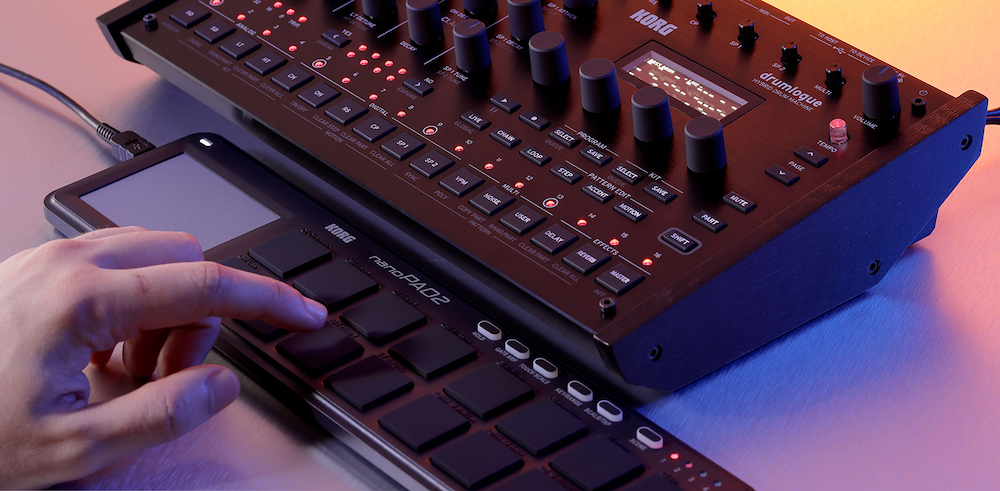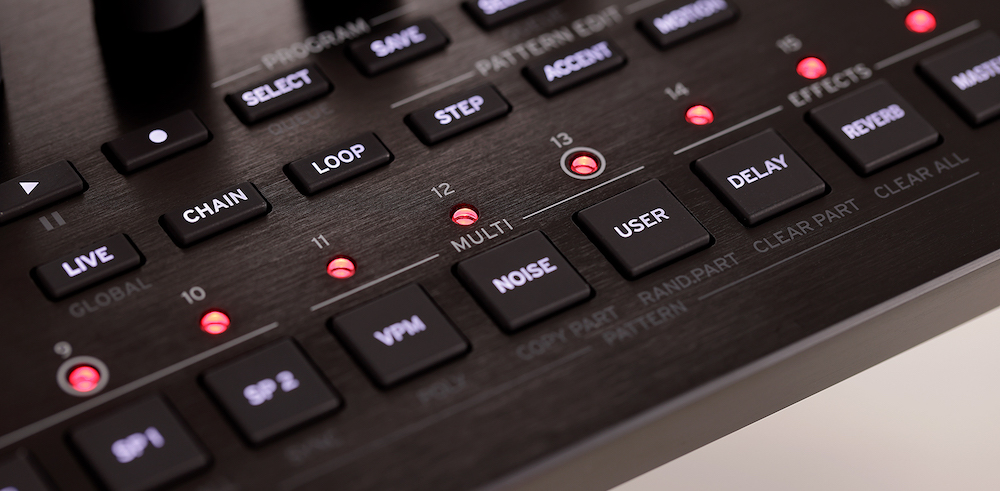Korg’s latest drum machine offers a combination of analogue and digital power at an impressively affordable price.

When Korg launched the Minilogue in 2016, it represented a new standard for affordable analogue synths. The Minilogue brought most of the power of vintage analogue synthesis to an unprecedented level of affordability, with modern updates like patch storage and MIDI control helping to make it an instant hit. You can probably guess the general formula for the new Korg Drumlogue already; it’s a relatively affordable drum machine with an analogue heart, although this time around there’s a digital element too. The Drumlogue promises to bring serious hybrid drum synthesis to a wider audience. If it’s even half as good as the Minilogue then it’s a winner.
The Drumlogue immediately feels familiar if you’ve used any recent Korg synths. The construction is similar to the Minilogue – relatively lightweight but reassuringly solid – and the control layout is about as intuitive as it’s possible to be within the confines of a broadly Roland x0x-style step sequencing approach. Likewise, there’s clearly depth to the editing options, as hinted at by the shift-key functions, but the main controls are laid out in such a way as to be clear and give you access to the most important features without menu diving. Round the back, you’ll find an impressive array of connectivity including a total of seven outputs (more of which later) plus MIDI over USB or 5-pin DIN (both in and out for each) and sync in/out for hooking up with devices like Korg Volcas and other analogue gear.

Sonically, the Drumlogue has a split personality. There are three dedicated analogue sections on the left-hand side of the control panel: bass drum, snare drum and toms. Each of these channels has three main controls, with shift functions for the high and low toms. The other aspect of the Drumlogue is hidden behind the remaining channels, marked as hi-hats, clap and (user-programmable) Sample 1/2, representing the sample-based digital capabilities of the instrument. The combination is very effective; you’ve got the raw analogue power of the basic circuits, which can turn their hand to classic thudding 909-style kicks and snappy snares. Where the digital side shines is in filling the gaps where the analogue parts might struggle, from sampling your own sounds through to generating basic synth elements.
As an aside, it’s worth noting that the idea of combining analogue and digital elements in a drum machine isn’t a new idea by any stretch of the imagination, not that that’s a criticism of the Drumlogue; as far back as 1983, Roland used samples for the hi-hats and cymbal sounds in the TR-909, a drum machine most people would assume is fully analogue. The Drumlogue is a far more versatile device than the classic Roland, but it’s a reminder that there aren’t many radically new concepts in music tech.

The Drumlogue doesn’t have traditional individual outputs, with a separate audio channel for each sound, but it does have four assignable outputs in addition to the main stereo outs and headphone out. As such, you can select outputs for your main sounds in order to process them separately to the stereo mix. In practice it’s a good compromise, allowing you to process the key elements of your drum pattern (the kick in particular) separately, while bundling everything else into a stereo sub-mix. Korg’s sequencers are usually very good, and there are reassuring hints of Volca and Electribe to the setup here. Programming patterns, editing them and adding effects is all intuitive. What you soon discover is that there’s far more depth to the Drumlogue than it might seem from the simple and straightforward main controls; the screen and menus give you access to the deeper programming options, via which you can dial in a huge range of sounds.

Like the best drum machines, the Drumlogue feels equally at home for programming beats in the studio or jamming out rhythms in real time. The performance options are well thought out, with individual level controls for each of the drum sounds (not just groups of sounds like hi-hats and toms but separate levels for closed hats and open hats, etc) and the option to use the 11 channel buttons as mutes. It’s not exactly the most advanced feature, but the ability to program complex patterns and then cut elements in and out is hugely creative. Channelling your inner Jeff Mills and using the Drumlogue as a live instrument, you can really explore the breadth and depth of the sound engine as well as the sequencer; start with a basic pattern, tweak the sounds, muts rome channels, introduce some new elements and you’ll instantly find yourself generating new ideas and heading down interesting routes. There’s no doubt the Drumlogue would also shine in a live setting.

Spending time with the Drumlogue is inspiring in creative terms, but it’s also a reminder of how good Korg are at creating cohesive instruments. There are a few other options around the same £500 price point – the digital Erica Synths/Sonic Potions LXR-02 springs to mind as an obvious alternative – but nothing quite offers the same combination of usability and analogue synthesis that Korg have nailed here. The Minilogue was revolutionary in terms of delivering pure analogue synth technology at an affordable price point. The Drumlogue perhaps doesn’t quite change the game in quite such a dramatic fashion, but it’s a very impressive instrument in its own right. Expect to see – and hear – a lot more of this one over the next few years.
Greg Scarth
More info/buy